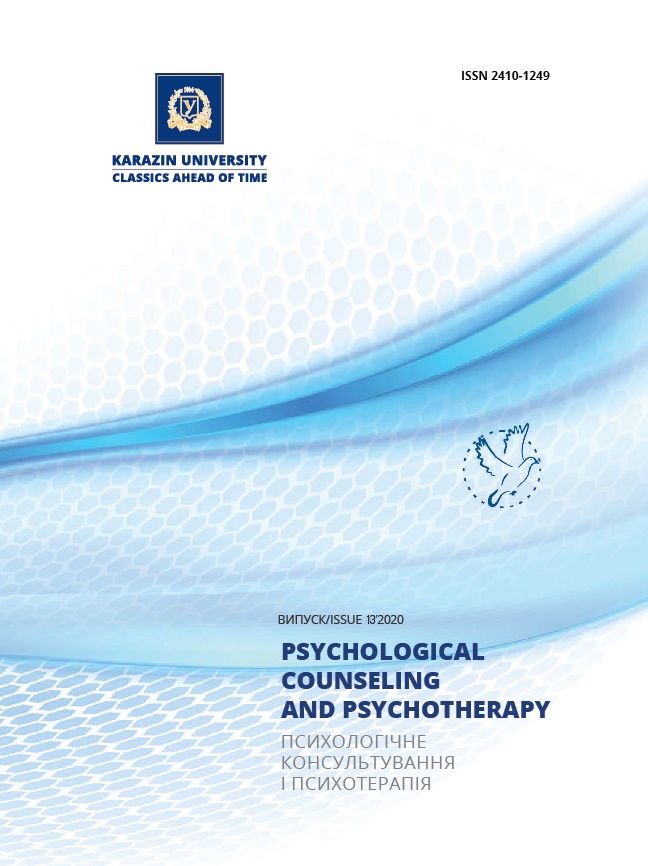Змістовні ресурси психологічного супроводу сімей, що мають проблемних дітей
Анотація
У статті представлена модель психологічного супроводу сімей, що мають проблемних дітей, описана система формувальних заходів, що має чітко структурований та організований характер і побудована на психологічних принципах. Останні забезпечено за допомогою спеціальних форм та методів програми психологічного супроводу, до яких увійшли: 1) на рівні психодіагностичного етапу стандартизовані й проєктивні методики; 2) на рівні психоедукаційного етапу – психопрофілактичні прийоми та просвітницькі заходи відповідно до емпіричних даних щодо прогалин психологічних знань та запитів самих досліджуваних; 3) на рівні психоконсультативного етапу – бесіда й інтерпретація як специфічні форми надання психологічної допомоги, орієнтованої на особистість і взаємодію між членами сім’ї, засвоєння ними ефективних способів самостійного розв’язання проблем; 4) на рівні психотерапевтичного етапу – інтерпретація та обговорення отриманих результатів у процесі емпіричного дослідження, проведення психотехнік «Сімейна скриня», «Написання казки», «Діаграма сім’ї» з подальшим зворотним зв’язком.
Завантаження
Посилання
Averyanov, L. Ya. (2009). Reader on psychology: Sat. work in general psychology. Moscow: Samizdat. (in Russian)
Ackerman, N. (2000). The role of the family in the development of disorders in children. Family psychotherapy. St. Petersburg: Peter. (in Russian)
Aleshina, Yu. E. (2004). Individual and family psychological counseling. Moscow: Class. (in Russian)
Albukhanova-Slavskaya, K. A. (1980). Activity and personality psychology. Moscow: Nauka. (in Russian)
Bandler, R., Grinder, J., Satir, W. (2000). Family Therapy and NLP. St. Petersburg: Institute of Humanitarian Research. (in Russian)
Bern, E. (2008). Games People Play. Moscow: Direct Media. (in Russian)
Bityanova, M. R. (2000). Organization of psychological work at school. Moscow: Genesis, 2000. (in Russian)
Bodalev, A. A. (2008). Personality and communication. Age and individual characteristics of the perception of a person by a person. Moscow: ANO PEB. pp. 103–112, 190–195. (in Russian)
Bodalev, A. A., Stolin V. V. (2006). General psychodiagnostics. St. Petersburg: Speech. (in Russian)
Bowlby, J. (2003). Attachment. Moscow: Gardariki. (in Russian)
Bowen, M. (1992). Spirituality and person-centered approach. Questions of Psychology, 3–4, 24–33. (in Russian)
Bowen, M. (2005). Murray Bowen's Theory of Family Systems: Basic Concepts, Methods, and Clinical Practice. Moscow: Kogito-center. (in Russian)
Brun, B., Pedersen, E., Runberg, M. (2000). Tales for the soul. The use of fairy tales in psychotherapy. Moscow: Inform. center of psychology culture. (in Russian)
Vekilova, S. A. (2009). Genogram as a method of studying intergenerational family relations. Modern problems of family psychology: phenomena, methods, concepts. Issue. 3. St. Petersburg: ANO "IPP". (in Russian)
Vygotsky, L. S. (2004). Psychology of child development. Moscow: Eksmo-Press: Meaning. (in Russian)
Ginzburg, M. R. (1991). Way to yourself. Moscow: Pedagogy. (in Russian)
Gornostay, P. P. (1997). Problem analysis in consulting practice. Practical psychology: theory, methods, technologies: mater. Sciences. seminar. Kiev: Nika Center, S. 72–78. (in Russian)
Zinkevich-Evstigneeva, T. D. (2006). Workshop on fairy tale therapy. St. Petersburg: Speech. (in Russian)
Zinkevich-Evstigneeva, T. D. (1998). The path to magic. Theory and practice of fairy tale therapy. St. Petersburg: Zlatoust. (in Russian)
Zinkevich-Evstigneeva, T. D., Kudzilov, D. B. (2003). Psychodiagnostics through drawing in fairy tale therapy. St. Petersburg: Speech. (in Russian)
Klochko, V. E. (1998). The formation of the multidimensional world of man as the essence of ontogeny. Siberian Psychological Journal, 8–9, 7–15. (in Russian)
Knyazev, E. A. (1993). Pedagogy and psychology of social deprivation (historical aspect). Questions of psychology / ed. E. V. Shchedrina. 3: 39-47. (in Russian)
Kulganov, V. A., Belov, V. G., Parfenov, Yu. A. (2013). Fundamentals of clinical psychology: textbook. for universities. third generation standard. St. Petersburg: St. Petersburg. state Institute of Psychology. and social work. (in Russian)
Langmeyer, I., Mateychek, Z. (2008. Mental deprivation in childhood and its prevention. Psychological problems of socialization of modern adolescents and young men: textbook / compiled by V.V. Barabanova. Moscow: ANO PEB,. S. 366–382. (in Russian)
Leontiev, D. A., Rasskazova, E. I. (2006). Vitality test. Moscow: Meaning. (in Russian)
Mastyukova, E. M., Moskovkina, A. G. (2004). Family education of children with developmental disabilities: textbook. allowance for students of higher education. educational institutions / ed. V. I. Seliverstov. Moscow: VLADOS. (in Russian)
Navaitis, G. (1999). Family in psychological counseling. Moscow: Moscow Psychological and Social Institute; Voronezh: NPO "MODEK". (in Russian)
Olifirovich, N. I., Velenta, T. F., Zinkevich-Kuzemkina, T. A. (2012). Family systems therapy. St. Petersburg: Speech.
Osipova, A. A. (2002). General psychocorrection. Moscow: Sphere. (in Russian)
Povyakel, N. I. (2005). Family counseling in the formation of partnership intention as a reflexive mechanism of self-regulation in the prevention and overcoming of conflicts. Actual problems of psychology. T. 3: Counseling psychology and psychotherapy: coll. of science of the Institute of Psychol. named after H. S. Kostyuk of the National Academy of Sciences of Ukraine/ed. S. D. Maksimenko, Z. G. Kisarchuk. Kyiv: Millennium. Vol. 3. 244 p. (in Ukrainian)
Propp, W. (1998). Structural and historical study of the fairy tale. Transformation of fairy tales. A cumulative story. Poetics of folklore. Moscow. (in Russian)
Radchuk, G. K. (2019). Cultural and psychological approach in the context of family upbringing. Humanitarium: coll. of science Proceedings of the Pereyaslav-Khmelnytskyi State Pedagogical University named after Hryhoriy Skovoroda. T. 42. Issue 1: Psychology. P. 138–146. (in Ukrainian)
Rubinstein, S. L. (2005). Fundamentals of General Psychology. St. Petersburg: Peter. (in Russian)
Savinov, L. I. (1996). Sociocultural determination of the value orientations of the family: author. dis. for the degree of Dr. sociological Sciences: 22.00.04/Institute of Siciology. Moscow. (in Russian)
Satir, W. (2004). Involving children in family therapy. Socio-psychological and advisory work with the family: a reader. Part 2: Socio-psychological and advisory work with the family / comp. L. B. Schneider. - Moscow: MPSI; Voronezh: MODEK. pp. 441–467. (in Russian)
Jung, K. (1994). Psychology of the unconscious. Moscow: Nauka. (in Russian)
Jung, K. (1997). Consciousness and the unconscious. St. Petersburg–Moscow: University. Book. (in Russian)
Bowen, M. (1978). Family Therapy in Clinical Practice. North vale, New York, Jason Aronson,. Chapter 16: Theory and practice.
Цитування
Peculiarities of socialization of children from problem families in the activities of the psychological service of secondary education institutions
Bondar Mykhailo & Shabaeva Nataliia (2025) Social pedagogy: theory and practice
Crossref








